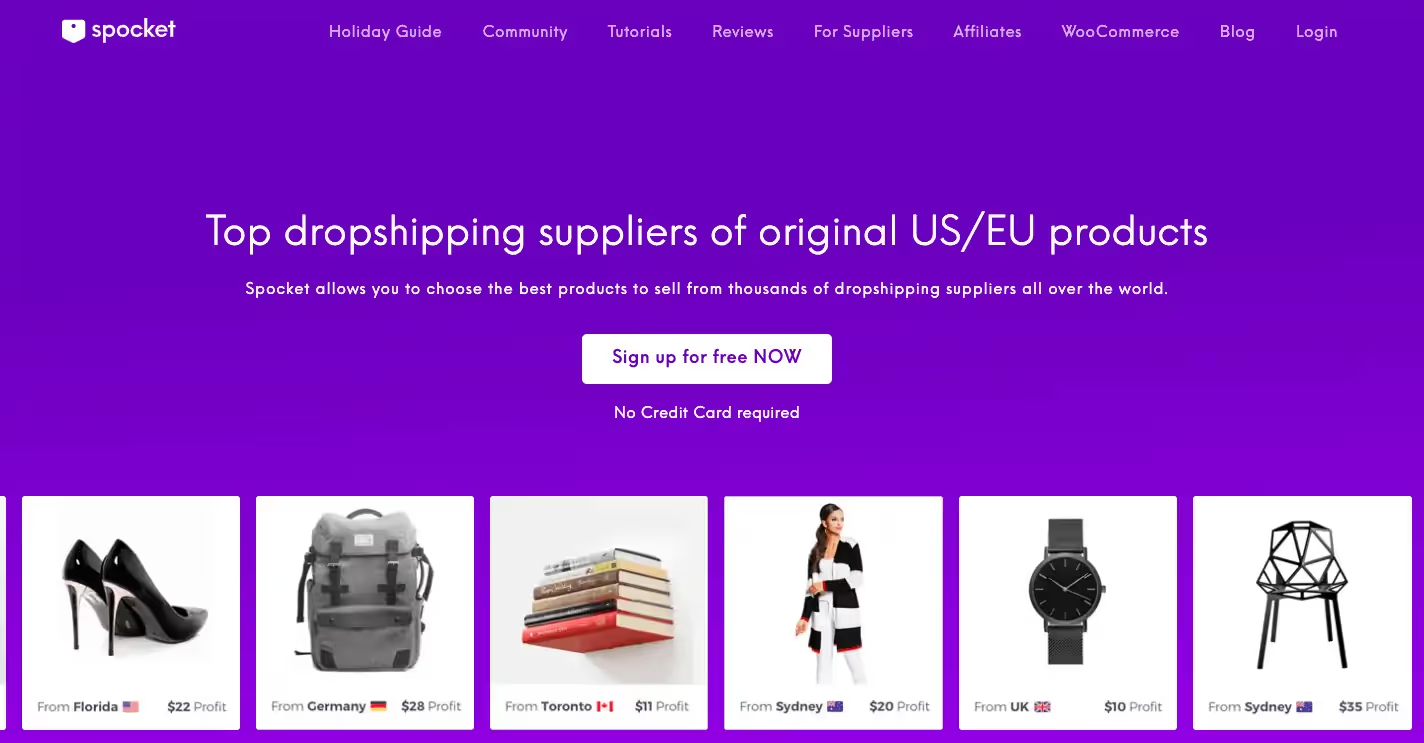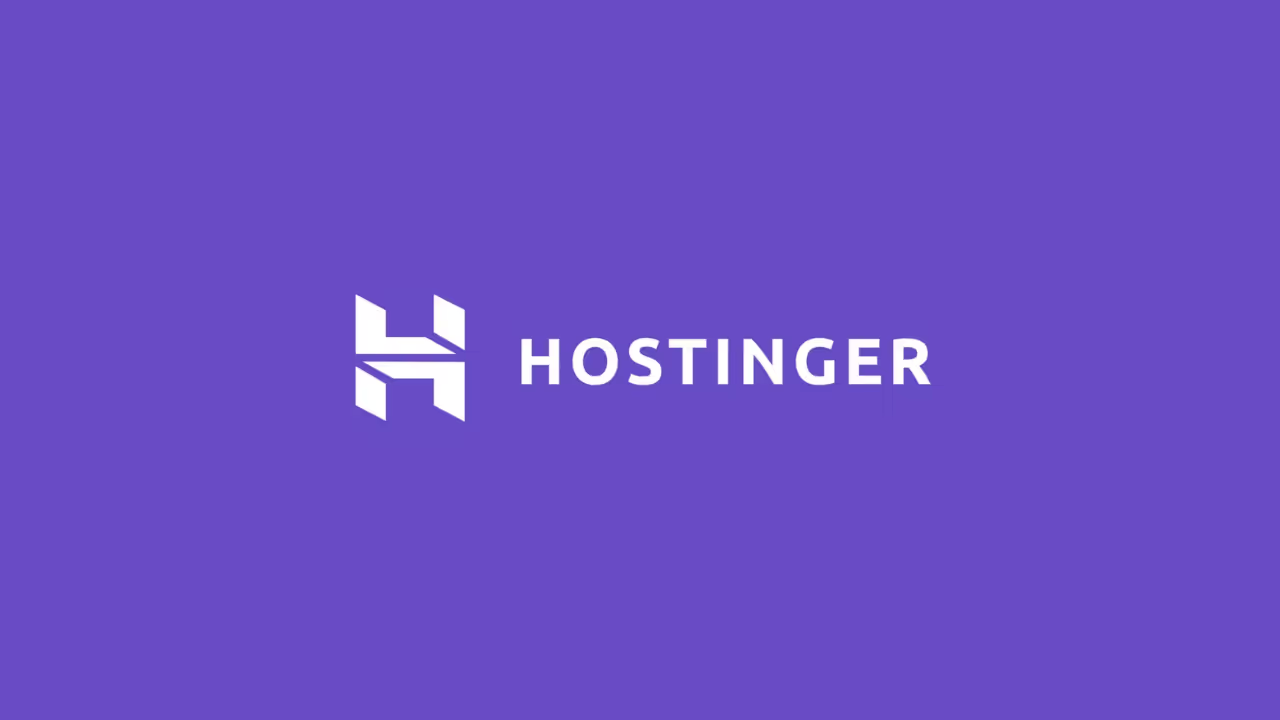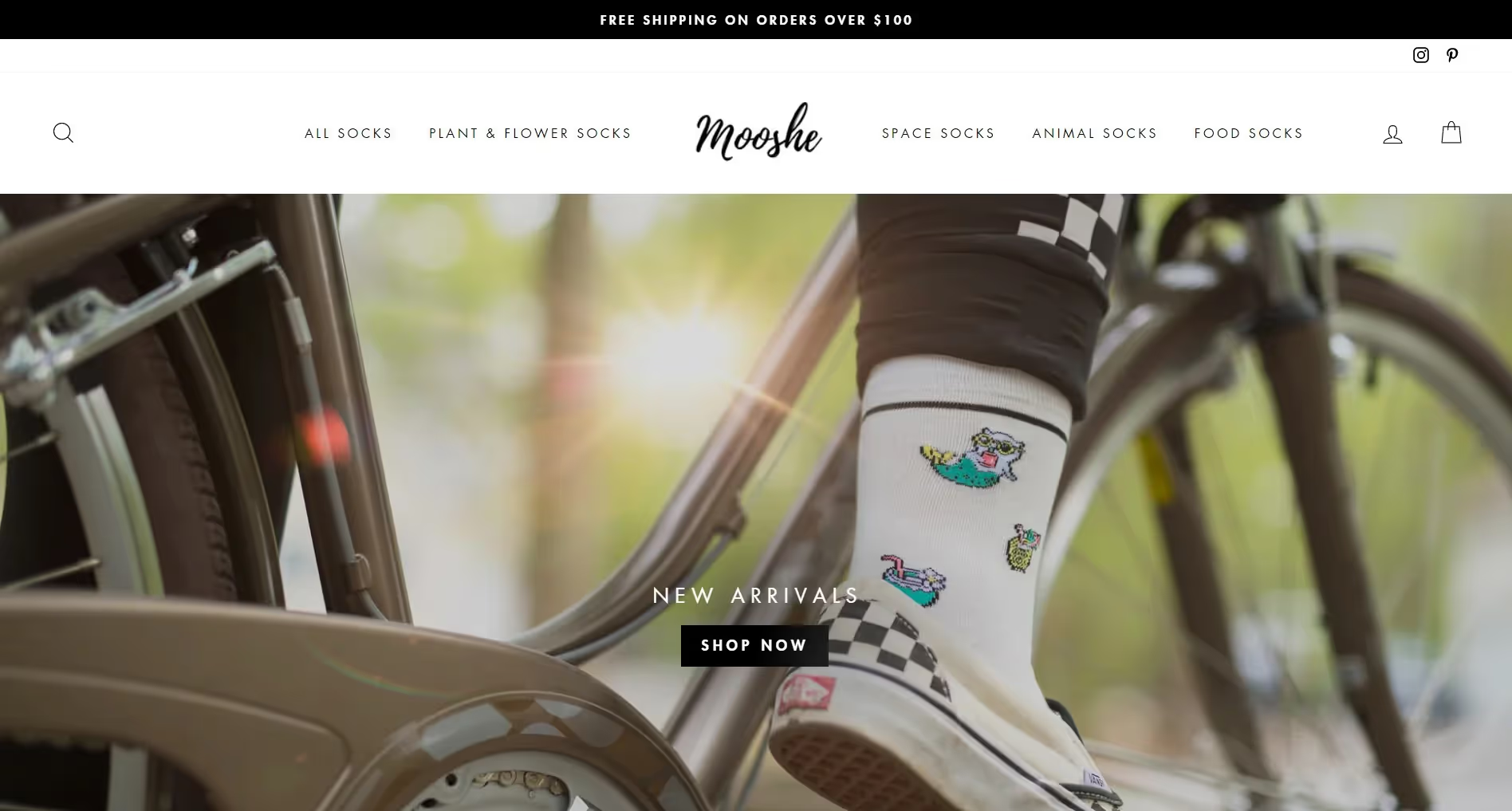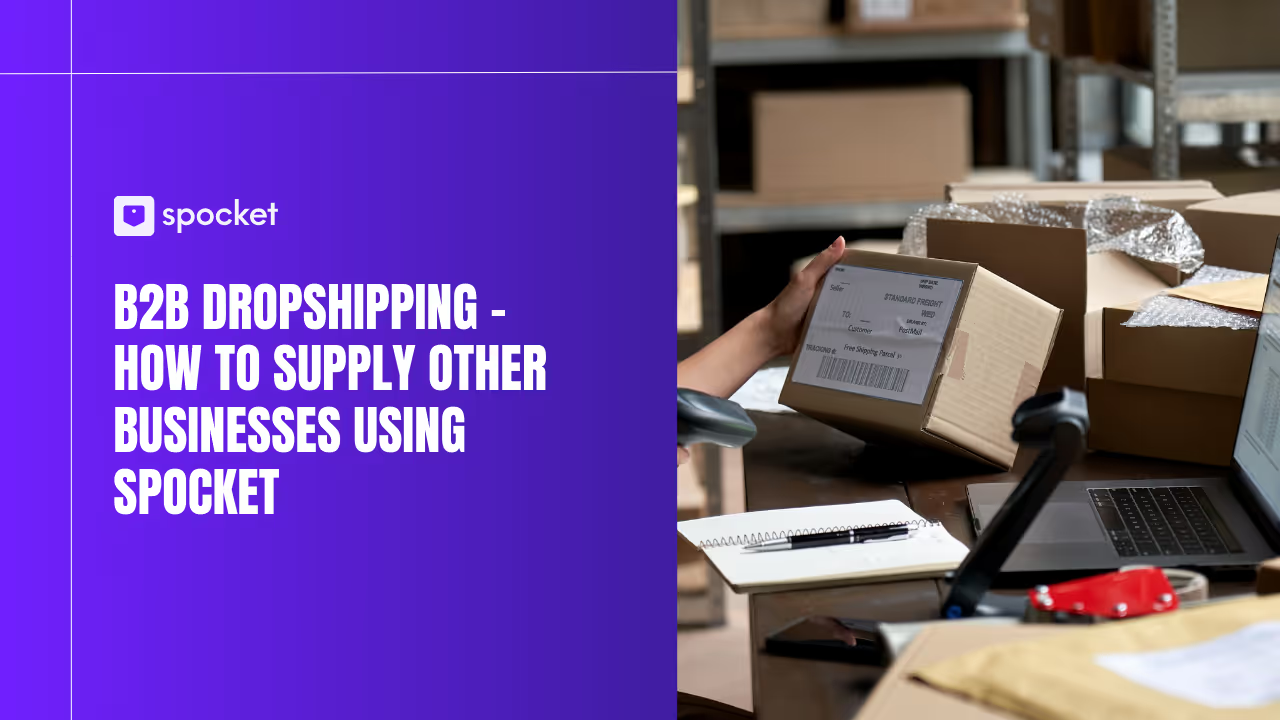7 Best Dropshipping Websites in 2026: Real Examples & How They're Winning
Find top dropshipping platforms and the best dropshipping websites. Learn what separates successful dropshipping websites from the rest in 2026.


Looking to start a dropshipping business but unsure where to even begin? You're not alone. The truth is, finding legitimate dropshipping websites that actually work can feel overwhelming when you're first getting started. Between sifting through endless platforms, dealing with slow shipping times, and trying to figure out which dropshipping stores are worth your time—it's a lot.
But here's the thing: the best entrepreneurs in this space didn't get lucky. They picked the right dropshipping platforms to build on, found quality dropshipping suppliers to partner with, and studied successful dropshipping stores to understand what works. That's exactly what you're about to do.
In this guide, we're breaking down the 7 best dropshipping websites that are crushing it in 2026, showing you real dropshipping examples so you can actually see how profitable stores are structured, and giving you the roadmap to find what works for your business. Whether you're targeting niche markets or going for volume, you'll see exactly what separates the winners from everyone else.
How to Find the Best Dropshipping Websites?
When you're hunting for top dropshipping stores, you can't just pick randomly and hope something sticks. The platform matters. The suppliers matter. And honestly, your entire business hinges on making the right call early.
What to Look for in Top Dropshipping Stores?
The best dropshipping websites all share specific traits. First, they've partnered with top dropshipping websites or best dropshipping suppliers that ship quickly. Americans especially hate waiting. If your customer ordered from you instead of Amazon, they expect speed—not 3-week waits from overseas.
Second, the store itself has to look professional. You could have the hottest products in the world, but if your site looks sketchy, nobody's buying. Take a look at top dropshipping website examples to see how top Shopify dropshipping stores nail their design. Clean layouts, high-quality images, and smooth checkout flows matter way more than most beginners realize.
Third, they've invested in branding. The most successful dropshipping stores don't just slap random products on a white label site. They build actual brands. Custom packaging, branded invoices, thoughtful product curation—these aren't luxuries. They're the difference between a one-time purchase and a repeat customer.
What Makes Some Shopify Dropshipping Stores Look Bad?
Here is what makes some of the best dropshipping websites go bad:
Poor Supplier Relationships
Bad dropshipping stores are constantly fighting with their suppliers. Orders take forever. Quality is inconsistent. Customers get frustrated, leave bad reviews, and never come back.
The good news? You can avoid this entirely by being selective about who you partner with. If you're using a dropshipping platform, stick with suppliers that have proven track records.
Zero Brand Identity
Some dropshipping shop owners treat their business like a vending machine. They list products, wait for orders, ship boxes. That's not a brand—that's a middleman with extra steps. The stores that actually make money have a point of view. They know their customer. They speak to them directly. Brand identity is important.
Ignoring User Experience
If your site is hard to navigate, your customers will bounce. If checkout has too many steps, people abandon carts. These aren't minor issues. They're revenue killers. The best Shopify stores are obsessed with removing friction from every step of the buyer journey.
What the Best Dropshipping Stores Do Right
The most successful dropshipping stores are operating with a different playbook than amateurs. Here's what separates them.
They Pick Their Niche Carefully
Successful dropshipping brands aren't trying to be everything to everyone. They find a specific market—whether it's pet lovers, fitness enthusiasts, or minimalist living fans—and they own that space. Niche selection gives you pricing power and builds customer loyalty. It also makes marketing way easier because you know exactly who you're talking to.
They Use the Right Tools
The best dropshipping websites integrate with platforms that make operations smooth. They use best dropshipping apps to automate inventory, sync orders across channels, and track shipments. Tools like profit margin calculators help them understand what actually makes money versus what just looks good on paper.
They Invest in Traffic
You can have the perfect store on the perfect dropshipping platform, but if nobody knows it exists, you're not making sales. The winning dropshipping stores are running paid ads, building email lists, creating content, and showing up on social media. They understand that the store is just one piece—traffic is everything.
They Care About Margins
Not all products are created equal. The best dropshipping suppliers provide items that let you charge reasonable prices while still making real profit. A $2 product cost with a $7 retail price means you're betting everything on volume. Most beginners can't handle that math. Smart operators focus on products with better margins that can sustain their business without 1,000 daily orders.
7 Best Dropshipping Websites in 2026
Here is a list of top dropshipping platforms in 2026:
1. Spocket

When you're looking at best dropshipping suppliers for Shopify, Spocket keeps coming up for good reason. This isn't some fly-by-night platform—they've built something real.
Spocket connects you with verified suppliers from the US and Europe. If you've been watching shipping times destroy your business, this is the antidote. Most of their suppliers ship within 2-5 days. That's domestic speed, which means your customers aren't waiting around angry.
The platform integrates with Shopify, WooCommerce, Amazon, eBay, and others. One-click product imports. Real-time inventory syncing. They've thought through the painful parts of dropshipping and automated them.
Spocket pricing starts at $39/month and goes up to $299/month depending on the plan. You get access to millions of products across multiple categories—tech accessories, home and garden decor, toys, bath and beauty, you name it. Plus, they offer sample orders and zero MOQs, so you can actually touch and feel products before you start selling them. That's how you avoid quality disasters.
The real kicker? They're one of the few dropshipping websites that handle print-on-demand customization, so you can create white label products with your branding if you want to go that route. And there's a detailed breakdown on how to create a dropshipping website using their tools if you need extra guidance.
2. Hostinger

If you're asking where to buy dropshipping websites, Hostinger is a sneaky good answer. They're known as a hosting provider, but they've built out a complete dropshipping platform for building online dropshipping stores.
Hostinger lets you launch up to 500 products on their platform. They give you 150+ beautiful templates and AI tools to help you build without coding. For a beginner who doesn't want to mess with Shopify setup fees and complexity, this is genuinely useful.
Many of the top dropshipping websites globally use Hostinger in some form. Some top Shopify stores run auxiliary pages on Hostinger. It's not flashy, but it works.
The real value here is simplicity. You can get a store live in hours, not weeks. The templates are clean enough that you're not embarrassing yourself. And their support is responsive if something breaks.
3. BaapStore

Want to know where India's most successful dropshipping stores launch their US operations? A lot of them test products on BaapStore first. This is India's top dropshipping platform, and they've processed over 5 million orders.
BaapStore is a 5G dropshipping platform with 150,000+ products across 15+ categories. They work with premium verified manufacturers. The profit margins here can actually be decent, which is rare for a general marketplace.
If you're just starting out and want to test products without massive investment, BaapStore is underrated. They've got the volume to negotiate better pricing with manufacturers than you could on your own.
4. MooShe Socks

This is a dropshipping store example worth studying. MooShe Socks is a niche Shopify dropshipping store focused on women's socks and accessories. They're not trying to sell everything—they own their lane.
What they do right is obsess over quality. Their product photography is stunning. Their copy is conversational and fun. They've built a design that reflects their brand identity instead of looking like a generic dropshipping website.
They use push notifications for cart recovery and offer subscription options to increase lifetime customer value. It's not complicated, but it's intentional. If you're looking for dropshipping website examples to understand store design, spend 10 minutes on their site. You'll see how a focused brand with good taste stands out.
5. Notebook Therapy

Notebook Therapy is another Shopify dropshipping store example worth paying attention to. They specialize in Japanese and Korean-inspired stationery—journals, planners, accessories. It's niche, it's aesthetic, and it's working.
Their website design is clean and intentional. Product photography is exceptional. Navigation is intuitive. They've created a brand where customers feel like they're discovering something special, not just buying random inventory.
This is what happens when a successful dropshipping store prioritizes design and curation over just listing products. They've turned stationary into an experience.
6. Zendrop

When people search for best dropshipping products to sell right now, Zendrop keeps showing up because their platform makes it easy to find winning items. They've got access to over 1 million products with US warehouse capabilities for fast shipping.
Zendrop pricing offers a free plan (limited), then paid plans starting at $49/month. The automation here is seriously good. Auto-fulfillment, tracking synced to your store, inventory management—they handle the boring part so you can focus on marketing.
They also offer white label and custom branding options if you want to create branded packaging and invoices. The platform integrates with Shopify, TikTok Shop, and ClickFunnels.
If you're torn between Zendrop and Spocket, here's the split: Zendrop is better for testing cheap products and scaling volume. Spocket is better if you want premium US dropshippers with faster shipping and better quality.
For Zendrop login and exploring their catalog, they make onboarding simple. Zendrop login takes two minutes.
7. Sadadropship
Sadadropship is built specifically for dropshippers who want to scale. Sada dropshipping is less known than Spocket or Zendrop, but serious operators know about it.
They connect you with suppliers for product sourcing, offer white labeling capabilities, and help you manage the entire supply chain. If you're past the beginner stage and need actual partnership support (not just a product catalog), Sadadropship operates differently.
The platform is built for entrepreneurs doing $50K+ monthly revenue. If you're there or heading there, they're worth exploring.
Best Dropshipping Products 2026 Examples
The best dropshipping products in 2026 aren't random—they follow patterns.
Home and Wellness Products are crushing it. People spent pandemic years making their spaces better. That trend never really stopped. Lighting, organization, comfort items—there's still strong demand.
Niche Fashion and Accessories work because they're repeatable. Socks, sunglasses, phone accessories—items people buy multiple times because they wear out or lose them. The top dropshipping stores aren't selling one-off gadgets. They're selling things customers repurchase.
Pet Products have been on fire for years. Pet owners spend money like crazy. If you can find quality pet supplies, you've got a real business. Pet niche stores consistently outperform general stores.
Tech Accessories matter because they have legs. A phone stand, a cable organizer, a desk lamp—these products help people solve real problems. There's no hype cycle. They just work.
Print-on-Demand Items are interesting because they let you create white label products without inventory risk. T-shirts, mugs, hoodies with custom designs. It's lower margin but incredibly flexible.
Best Dropshipping Apps & Platforms to Build Your Store
The right dropshipping platform changes everything. You could have perfect suppliers, but if your tool is clunky, you'll spend all your time fighting software instead of running your business.
Shopify remains the king for a reason. Yes, it costs $29-$299/month depending on the plan, but you get best dropshipping apps integration, marketing tools, and analytics that actually make sense. It's not the cheapest, but it's the most scalable.
Wix works well if you want integrated marketing tools and simple setup. Less powerful for high-volume stores, but genuinely solid for getting started.
WordPress + WooCommerce is the budget option if you're comfortable with tech. It's flexible but requires more setup work.
For actually finding products, AI dropshipping tools like Sell The Trend are becoming standard. Platforms now have recommendation engines that surface trending items based on customer behavior. It's not magic, but it saves time.
If you're starting completely free, there are free dropshipping websites to test, but honestly? The cost of a real platform ($20-40/month) is so small compared to your potential revenue that skipping it to save money doesn't make sense. And these are some great ecommerce fulfillment methods to boot.
Conclusion
Building a dropshipping business in 2026 means picking the right dropshipping platforms, finding best dropshipping suppliers who actually deliver, and studying dropshipping store examples to understand what works. The stores winning right now aren't doing anything magical. They're being thoughtful about suppliers, intentional about brand design, and disciplined about traffic.
You now know the top dropshipping websites worth your attention. You've seen dropshipping website examples of what success looks like. The next step is picking a platform, finding your niche, and actually launching.
Get started with Spocket today.
Best Dropshipping Websites FAQs
What's the difference between Zendrop and Spocket for dropshipping?
Both platforms connect you to suppliers, but they serve different needs. Zendrop offers lower product costs and a free plan, making it better for testing cheap products at scale. Spocket focuses on US and EU suppliers with 2-5 day shipping, premium product quality, and higher prices—ideal if you're prioritizing customer experience over margin volume. Your choice depends on whether you want to compete on price or speed.
Can I start dropshipping for free in 2026?
You can test dropshipping using free platforms like Zendrop's free plan or Modalyst's 25-product free tier. However, truly "free" isn't realistic for serious stores because you'll need a domain, hosting, and marketing budget. Most successful entrepreneurs invest $100-300/month to launch and run a real dropshipping business with decent tools and traffic.
What makes certain Shopify dropshipping stores more successful than others?
Successful Shopify stores combine quality product sourcing, professional store design, niche targeting, and consistent traffic generation. They obsess over user experience, invest in paid ads or content marketing, and use best dropshipping suppliers that ship fast. The store design matters—customers judge credibility in seconds and many abandon poorly designed sites before even looking at products.
How do I choose between different dropshipping suppliers?
Start by identifying your target customer and geographic location. If you're targeting the US and speed matters, choose US dropshippers through platforms like Spocket. If you're testing cheap products, Zendrop's global suppliers work better. Always order samples first, check shipping times, and review supplier reviews before committing to your inventory.
Is white label dropshipping profitable in 2026?
White label and custom branding options exist across platforms, but profitability depends on your margins and marketing. Print-on-demand white label products are lower margin (20-40%) but have less competition. Traditional dropshipping with custom invoicing and packaging can hit 50%+ margins if you pick products well and have reliable suppliers.
What's the easiest dropshipping platform for complete beginners?
Hostinger and Modalyst rank highest for beginner-friendliness because they handle hosting, design templates, and integration in one place. Shopify has more complexity but better long-term scalability. If you want zero technical friction, Hostinger. If you want maximum growth potential, Shopify plus Spocket or Zendrop.
Launch your dropshipping business now!
Start free trialRelated blogs

How to Find Suppliers with 2-Day Shipping in the USA?
Customers expect delivery in 2 days online shopping. This guide shows you how to find 2 day shipping suppliers in the USA. Get fast shipping without the high costs and keep your buyers happy.

B2B Dropshipping - How to Supply Other Businesses Using Spocket
Grow recurring orders from business clients using B2B dropshipping. See how Spocket supports sourcing, pricing, and fulfillment for modern wholesale brands.

Is Dropshipping Dead in 2026?
The dropshipping market is projected to hit $1.25 trillion by 2030. But is dropshipping dead in 2026? We analyzed the data and spoke to store owners. Here is what you need to know.

































